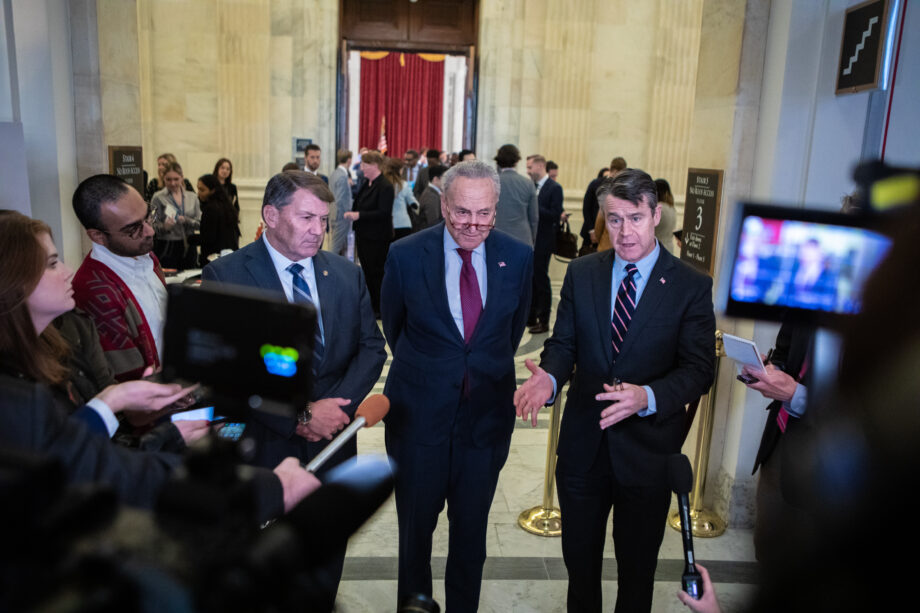- Government AI funding is a top priority in the Senate working group’s policy roadmap, aiming to increase federal research funding for AI innovation.
- The bipartisan Senate AI Working Group, including Sens. Rounds, Heinrich, Young, and Schumer, released the roadmap to address various AI-related issues.
- Recommendations in the roadmap include reaching $32 billion in annual spending on non-defense AI innovation, funding accounts related to AI under the CHIPS and Science Act, and authorizing the National AI Research Resource.
- The roadmap received both praise and criticism, with TechNet supporting the funding initiatives for AI development and Accountable Tech criticizing the influence of Big Tech in shaping the roadmap.
- The roadmap aims to stimulate bipartisan AI legislation, ensure U.S. innovation leadership, and benefit Americans through AI opportunities, emphasizing targeted legislation over a comprehensive plan.
Government AI Funding: A Critical Component of Senate Working Group Roadmap
In a significant move to prioritize the advancement of artificial intelligence (AI) technology, a bipartisan Senate working group has unveiled a comprehensive policy roadmap that underscores the importance of increasing government funding for AI research. The roadmap, released by the Bipartisan Senate AI Working Group, highlights various key areas where consensus has been reached among policymakers, with a particular emphasis on boosting federal investment in AI initiatives. Let’s delve deeper into the details of this groundbreaking development and its implications for the future of AI innovation.
Consensus on AI Funding and Policy Priorities
The Senate working group’s roadmap serves as a crucial blueprint for bipartisan collaboration on AI-related legislation, aiming to propel the United States to the forefront of AI innovation while ensuring that the benefits of this transformative technology are accessible to all Americans. One of the central pillars of the roadmap is the call for increased federal research funding in the field of AI, reflecting a shared recognition among lawmakers of the strategic importance of investing in cutting-edge technologies.
The report not only advocates for ramping up AI spending but also addresses other key issues such as the proliferation of deepfakes, the need to upskill workers to adapt to an AI-driven economy, and the imperative of fully funding a National AI Research Resource. By outlining these priorities, the working group seeks to catalyze bipartisan support for targeted legislative measures that address the challenges and opportunities presented by AI.
Related Video

Urgent Call for Enhanced Government Investment in AI
At the core of the Senate working group’s recommendations is a resounding call for the executive branch and the Senate Appropriations Committee to swiftly ramp up annual spending on non-defense AI innovation. The proposal, amounting to $32 billion, aligns with the National Security Commission on Artificial Intelligence’s earlier recommendation and underscores the urgent need to bolster government research and development efforts in the AI domain.
Moreover, lawmakers are keen on ensuring that accounts related to AI research receive adequate funding under legislation such as the CHIPS and Science Act, with a specific focus on bolstering initiatives within the National Science Foundation’s Directorate for Technology, Innovation, and Partnerships. By enhancing financial support for these critical programs, policymakers aim to enhance U.S. competitiveness in emerging technologies and foster a conducive environment for AI-driven innovation.
Praise and Criticism Surrounding the Roadmap
The Senate working group’s roadmap has elicited a mix of reactions from various stakeholders, with industry leaders and advocacy groups offering divergent perspectives on the proposed policy priorities. While organizations like TechNet have lauded the roadmap for its advocacy of funding initiatives such as the AI Safety Institute and the National AI Research Resource, critics, including groups like Accountable Tech, have raised concerns about the influence of big tech companies on the policymaking process.
TechNet’s president and CEO, Linda Moore, commended the roadmap for its commitment to supporting critical AI initiatives, emphasizing the importance of empowering a new generation of AI leaders and expanding innovation across the country. In contrast, Nicole Gill, co-founder of Accountable Tech, criticized the roadmap for allegedly prioritizing industry interests over addressing the challenges associated with widespread AI adoption, highlighting the need for a more comprehensive approach to AI policy.
The Senate working group’s roadmap represents a significant step towards shaping the future trajectory of AI policy in the United States. By emphasizing the critical role of government funding in advancing AI research and innovation, policymakers are laying the groundwork for a collaborative and forward-thinking approach to harnessing the full potential of artificial intelligence for the benefit of society. As discussions around AI legislation continue to evolve, it is imperative for stakeholders to engage in constructive dialogue and ensure that policy decisions align with the broader goals of promoting AI ethics, inclusivity, and technological progress.
Links to additional Resources: